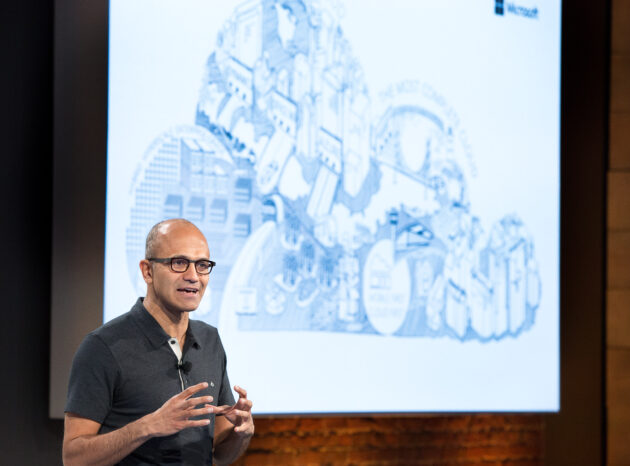Microsoft: ‘We are proud that we are an integral partner’ of DoD after winning $10B JEDI contract

Microsoft finally issued a statement after the Department of Defense announced late Friday that it awarded a $10 billion cloud contract to the Redmond, Wash.-based company.
The decision ended a dramatic selection process that involved multiple tech giants including Microsoft rival Amazon, which had been seen as the frontrunner for the Joint Enterprise Defense Infrastructure (JEDI) cloud contract that will migrate the Pentagon’s computing infrastructure and data to the cloud.
It’s a giant win for Microsoft and its budding cloud business that has been gaining market share on Amazon Web Services and continues to help power the company’s bottom line.
Here’s the full statement Microsoft shared with GeekWire on Saturday afternoon:
“For over 40 years, Microsoft has delivered innovative, proven and secure technologies to the US Department of Defense (DoD). We brought our best efforts to the rigorous JEDI evaluation process and appreciate that DoD has chosen Microsoft. We are proud that we are an integral partner in DoD’s overall mission cloud strategy. As was articulated throughout the JEDI procurement, the DoD has a singular objective – to deploy the most innovative and secure commercially available technology to satisfy the urgent and critical needs of today’s warfighters. We look forward to expanding our longstanding partnership with DoD and support our men and women in uniform at home, abroad, and at the tactical edge with our latest unique and differentiated Azure cloud capabilities.” – Toni Townes-Whitley, President, US Regulated Industries, Microsoft
Townes-Whitley joined Microsoft in 2015 after spending nearly five years at CGI Federal, a subsidiary for CGI that builds tech services for federal government agencies. She now “leads Microsoft’s US sales strategy for driving digital transformation across customers and partners within the public sector and regulated industries,” according to her LinkedIn profile.

Microsoft said it has more than 10,000 customers across various levels of government, including “every military branch and all federal cabinet departments.” It has partnerships with groups such as the Department of Veterans Affairs, USDA Agricultural Research Service, and the Department of the Interior. Some of Microsoft’s government-specific cloud services include Azure Government, Microsoft 365 Government, and Dynamics 365 Government.
The company pointed GeekWire to a series of blog posts highlighting related work.
“As agencies face a range of new challenges in meeting their missions, we are committed to helping our more than 10,000 government customers use technology to unlock the power of data, which underpins everything they do,” Townes-Whitley wrote in a post earlier this month about new cloud services. “I look forward to sharing many more examples of how government is embracing tech intensity to better engage and connect with citizens, modernize the government workplace, and enhance government services to benefit society.”
Not everyone at the company is happy with its work for the federal government. Microsoft workers are organizing to put pressure on the company to cancel contracts with agencies such as Immigration and Customs Enforcement. The employee activism stems from anger over some of President Trump’s administration policies.
Microsoft President Brad Smith addressed those concerns during an interview with GeekWire last month.
“Our view is, we actually don’t think it makes sense to just cancel contracts in democratically elected societies and start unplugging people from technology,” Smith said. “In part, we do feel that way as a matter of principle. The government was elected, the companies were not. Imagine if you’re the electric company and you say, ‘hey we don’t like what this government agency enacted so we’re going to unplug them.’”
There is also trepidation with artificial intelligence and other emerging technologies that create new ethical questions about building services for the military. Earlier this year a group of Microsoft employees protested the company’s $480 million contract to outfit the U.S. Army with 100,000 HoloLens headsets.
“We are alarmed that Microsoft is working to provide weapons technology to the U.S. Military, helping one country’s government ‘increase lethality’ using tools we built,” the employees wrote in a letter. “We did not sign up to develop weapons, and we demand a say in how our work is used.”
Microsoft CEO Satya Nadella later defended that decision.
“We made a principled decision that we’re not going to withhold technology from institutions that we have elected in democracies to protect the freedoms we enjoy,” Nadella said in an interview with CNN.
Smith explained why Microsoft decided to pursue the JEDI contract in a blog post published exactly one year ago. From the post:
“We readily decided this summer to pursue this project, given our longstanding support for the Defense Department. All of us who live in this country depend on its strong defense. The people who serve in our military work for an institution with a vital role and critical history. Of course, no institution is perfect or has an unblemished track record, and this has been true of the U.S. military. But one thing is clear. Millions of Americans have served and fought in important and just wars, including helping to free African-Americans who were enslaved until the Civil War and liberate nations that had been subjected to tyranny across Western Europe in World War II. Today the citizens in our military risk their lives not only as the country’s first line of defense, but often as the nation’s first line of assistance around the world in hurricanes, floods, earthquakes and other disasters.
We want the people of this country and especially the people who serve this country to know that we at Microsoft have their backs. They will have access to the best technology that we create.”
Google dropped out of the running for the JEDI contract this past October, saying that “we couldn’t be assured that it would align with our AI Principles” and noting portions of the contract “were out of scope with our current government certifications.”
Much like Microsoft, Amazon also touts its government-related work and AWS GovCloud.
Speaking last year at a Wired conference just after Google’s decision to back out, Bezos was asked about his philosophy in regard to big tech companies working with government.
“We are going to continue to support the DoD, and I think we should,” Bezos said. “One of the jobs of a senior leadership team is to make the right decision, even when it’s unpopular. If big tech companies are going to turn their back on the U.S. Department of Defense, this country is going to be in trouble.”
Amazon said it was “surprised” with the DoD’s decision to give Microsoft the JEDI contract.
“We’re surprised about this conclusion,” an Amazon Web Services spokesperson said in a statement sent to GeekWire on Friday. “AWS is the clear leader in cloud computing, and a detailed assessment purely on the comparative offerings clearly lead to a different conclusion. We remain deeply committed to continuing to innovate for the new digital battlefield where security, efficiency, resiliency, and scalability of resources can be the difference between success and failure.”
The Pentagon was expected to announce a winner this summer, but the timeline was delayed after President Trump raised concerns about the fairness of the process, with Amazon considered the front-runner. Microsoft’s surprise win of JEDI will likely be seen as politically motivated in some circles.
Amazon could protest the DoD’s decision through the Government Accountability Office. The Washington Post reported that Amazon is “evaluating its options.”
“We are going to continue to support the DoD, and I think we should,” Bezos said. “One of the jobs of a senior leadership team is to make the right decision, even when it’s unpopular. If big tech companies are going to turn their back on the U.S. Department of Defense, this country is going to be in trouble.”
Conclusion: So above is the Microsoft: ‘We are proud that we are an integral partner’ of DoD after winning $10B JEDI contract article. Hopefully with this article you can help you in life, always follow and read our good articles on the website: Ngoinhanho101.com





